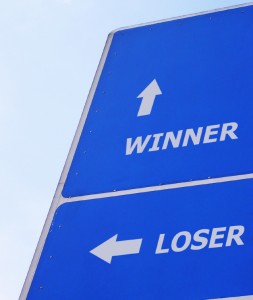Relegate the State – A Modest Proposal – 1

You’ve been relegated.
I’ve always admired the European system of relegating athletic teams to lower divisions when they don’t perform well. The system creates much better competition while rewarding teams that do well and penalizing teams that fail.
Let’s say you own a soccer team in the “A” league, the highest level of competition. In addition to the “A” league, your country also has a “B” league, a “C” league, etc. Being in the “A” league provides a lot of privileges – greater attendance, television revenue, prestige, and so on. You have a lot of incentive to keep your club in the “A” league.
At the end of each season, however, the bottom three teams in the “A” league are relegated to the “B” league. At the same time, the top three teams in the “B” league are promoted to the “A” league. (The number of teams moving up or down varies from league to league). You have a very strong incentive not to let your team fall to the bottom of the standings.
In the American system, on the other hand, an “A” league team will always stay in the “A” league, no matter how poorly it performs. There’s no chance that my Colorado Rockies will be relegated to the minor leagues even though they stunk up the major leagues last year.
The American system creates a number of perverse incentives. There’s a clear incentive to lose games one year to improve your draft position the next year. Even if you have a crummy team, you still get to share in league-related income, like TV revenues. You don’t get the glory of winning a championship, but the financial penalties of failing are not very stiff. If you’re just in it for the money, there’s no real incentive to win.
The European system seems clearly superior. It creates greater competition, removes perverse incentives, and creates a system of accountability. You win, you’re in. You lose, you’re out. That seems much more American than European.
I’ve been wondering lately if we couldn’t apply a relegation system to the states of the United States. We have 50 states and some are clearly more successful than others. Even the failing states, however, reap huge rewards from remaining in the union.
In our current system, there’s no real incentive for a state to succeed. Even if a state fails, it still gets huge subsidies from other states. In fact, the greater the failure, the greater the subsidy. It’s a perverse incentive: the worse you do, the more you get.
In fact, some states – let’s call them moocher states – get a net benefit of billions of dollars from the federal government. These states pay a relatively small amount in federal taxes but get huge federal subsidies in return. There’s no incentive for such a state to invest locally. It would only reduce the federal subsidy.
The giver states, on the other hand, are penalized for their success. They see their moneys drained away to subsidize the moocher states. This reduces their incentive to continue to succeed.
So, what to do with the moocher states? Let’s set up a league table and rank states on their success. Every ten years, let’s drop the bottom five from the union. That will improve competitiveness, enhance local autonomy, emphasize responsibility and accountability, and erase perverse incentives. What could be more American than that?